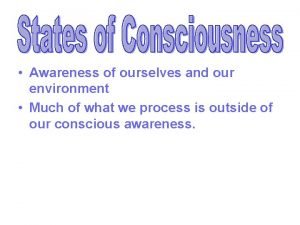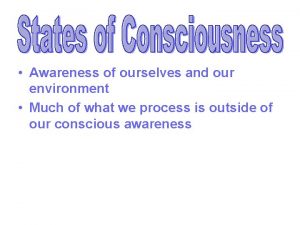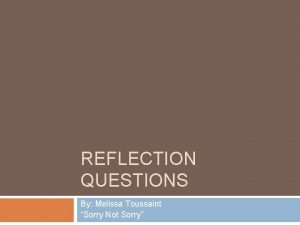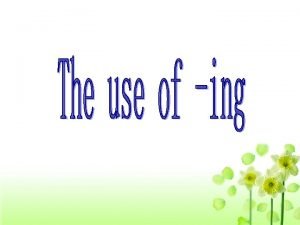Sorry Not Sorry LIS Women Professionals and Our









- Slides: 9

"Sorry, Not Sorry": LIS Women Professionals and Our Culture of Apology A talk by Annie Tang, Archivist @tanganniew Johns Hopkins University

“Sorry is a sorry word. ” “For so many women, myself included, apologies are inexorably linked with our conception of politeness. Somehow, as we grew into adults, ‘sorry’ became an entry point to basic affirmative sentences. ” -Sloane Crosley, The New York Times Sloane Crosley, “Why Women Apologize and Should Stop”, The New York Times, June 23 rd, 2015.

Let’s SCIENCE this! ● Women have a “lower threshold” for offenses (Schumann and Ross, 2010) ● Imagined apologies more valued than real-life ones ○ People “rated the value of an apology much more highly when they imagined receiving an apology than when they actually received an apology” (De Cremer et al. , 2011) ● Inside Amy Schumer , “I’m Sorry” sketch, 2015. Sincere apologies do work (Beyens et al. , 2015) Pantene commercial, “Not Sorry”, 2014.

To say it or not: think-pair-share ● How many times a day do you think you say the word “sorry” or “apologize”? ● Please share about a time you apologized when it was absolutely unnecessary. How would you go about the same situation again? ● What strategies do you implement, or what will you do, to communicate better in our culture of excessive apology?

Alternatives to apologetic language ● ● “Question” or “Comment” instead of hand raising “Thanks” “Excuse me” (when appropriate) Direct responses vs. Indirect ● Be real Rae Jacobsen, “Why Girls Apologize Too Much: How to help them stop saying 'sorry' and express confidence”, Child Mind Institute, accessed July 23, 2017.

Intersectional in the library ● Women in leadership ○ 4. 6% in 1972 => 52. 1% in 2004 (Deyrup, 2004) ● POCs ○ 12% (ALA Office for Research & Statistics, 2010) ● Salary disparities ○ 7% pay gap between men and women (AFL-CIO, 2014)

Speak for yourself, not down to yourself “It’s not what we’re saying that’s the problem, it’s what we’re not saying. The sorrys are taking up airtime that should be used for making logical, declarative statements, expressing opinions and relaying accurate impressions of what we want. ”Sloane Crosley, “Why Women Apologize and Should Stop”

Resources cited AFL-CIO, Department for Professional Employees, “Library Workers: Facts & Figures”, 2016, accessed July 20, 2017, http: //dpeaflcio. org/programs-publications/issue-fact-sheets/library-workers-factsfigures/. American Library Association, Office for Research & Statistics, “Diversity Counts”, 2012, accessed July 20, 2017, http: //www. ala. org/offices/diversitycounts/divcounts. Urielle Beyens, Hongbo Yu, Ting Han, Li Zhang, and Xiaolin Zhou, “The strength of a remorseful heart: psychological and neural basis of how apology emolliates reactive aggression and promotes forgiveness”, Frontiers in Psychology , Volume 6 (2015). David De Cremer, Madan M. Pillutla, Chris Reinders Folmer, “How Important Is an Apology to You? : Forecasting Errors in Evaluating the Value of Apologies”, Psychological Science , Volume 22, Issue 1 (January 2011). Sloane Crosley, “Why Women Apologize and Should Stop”, The New York Times, June 23 rd, 2015.

Resources cited, continued Marta Mestrovic Deyrup, “A Career of Our Own: Academic Librarians Reflect on Gender and Leadership”, American Libraries , March 9, 2015, accessed July 20, 2017, https: //americanlibrariesmagazine. org/2015/03/09/a-career-of-our-own/. Rae Jacobsen, “Why Girls Apologize Too Much: How to help them stop saying 'sorry' and express confidence”, Child Mind Institute, accessed July 23, 2017, https: //childmind. org/article/why-girlsapologize-too-much/. Karina Schumann and Michael Ross, “Why women apologize more than men: gender differences in thresholds for perceiving offensive behavior”, Psychological Science , Volume 21, Issue 11 (November 2010).
 Be safe not sorry cartoon
Be safe not sorry cartoon Write one word in each space
Write one word in each space Which is not a role for sport instruction professionals
Which is not a role for sport instruction professionals Not genuine not true not valid
Not genuine not true not valid Awareness of ourselves and our environment is:
Awareness of ourselves and our environment is: Our awareness of ourselves and our environment.
Our awareness of ourselves and our environment. Awareness of ourselves and our environment
Awareness of ourselves and our environment Our awareness of ourselves and our environment
Our awareness of ourselves and our environment Poker should not be played in a house with women
Poker should not be played in a house with women Thinking affects our language which then affects our
Thinking affects our language which then affects our

















